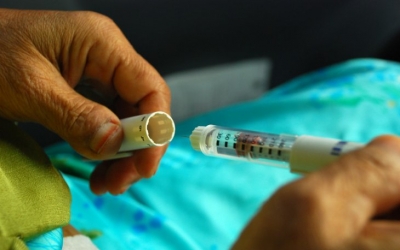- Latest news▼
-
10:23, April 19 JAMA Oncology: Urine test can help rule out high-grade prostate cancer with almost 100% accuracy, study shows

-
18:00, April 18 Daily Mail: Elderly woman in China gets infected with brain-eating amoeba

-
14:19, April 18 Obesity: exercising before breakfast helps you lose weight faster

-
10:42, April 18 The Conversation: childhood trauma can cause pathological hoarding

-
08:37, April 18 Daily Mail: Satiating food reduces cravings for sweets, nutritionist says

-
18:22, April 17 First Armenian-German Conference entitled “Heart Failure Spring School”

-
08:38, April 17 Why do kids usually recover from COVID-19 more easily than adults?

-
14:37, April 16 Daily Mail: intermittent fasting is not suitable for children and women before their periods

-
16:41, April 15 Cell: in carriers of defective BRCA2 gene, sugar consumption increases cancer risk

-
15:04, April 15 305 cases of measles recorded in Armenia so far in 2024

-
14:38, April 15 Food and Environmental Virology: tea contributes to effective coronavirus control

-
12:41, April 15 Daily Mail: vitamin A, B3 and E supplements can be dangerous

-
10:56, April 15 Diabetes Care: evening physical activity is good for the heart

-
08:27, April 15 Women are more susceptible to blood loss and death during bypass surgery than men, researchers say

-
18:42, April 13 WHO: Nigeria pioneers revolutionary meningitis vaccine

All materials
Artificial pancreas could transform diabetes treatment

An artificial pancreas which automatically regulates blood sugar could revolutionise treatment for millions of diabetes sufferers across the world.
Scientists from the University of California Santa Barbara have developed an implantable substitute organ which uses an algorithm to monitor patients' blood glucose levels in order to automatically calculate and deliver the required dose of insulin.
The researchers hope the artificial pancreas will be made available to sufferers of type 1 diabetes within five years. Type 1 diabetes is a lifelong condition where the sufferer's pancreas fails to produce any insulin, the hormone which regulates the amount of glucose in the blood.
An estimated 56.3 million people suffer from diabetes in Europe, equivalent to 8.5% of the adult population, according to the International Diabetes Federation. Europe has the highest number of children with type 1 diabetes than any other region in the world.
The Federation reports that diabetes caused the deaths of 4.9 million in 2014, meaning the disease kills one person every seven seconds.
According to Europe.newsweek.com, Type 1 diabetes cannot be cured so treatment is aimed at maintaining blood glucose levels at a normal level and controlling the symptoms. Sufferers have to inject insulin several times a day to regulate their blood sugar levels or use insulin pump therapy, where insulin is constantly pumped into the patient's bloodstream through a needle inserted under the skin.
In their study, which was published in the Industrial & Engineering Chemistry Research journal, the researchers found that the artificial pancreas maintained optimum blood glucose levels 78% of the time, meaning that hypoglycemia could be completely avoided. This is the condition which occurs when blood sugar falls below normal levels and can lead to sufferers' falling into a coma, or even dying in severe cases.
The device was computer tested in conditions which simulated the natural rise of fall in glucose levels which occur due to meals and sleep. The team will next test the device in animals.
At a press conference in January, professor Francis Doyle, who led the study, said the advance would have immediate benefits both for the quality of life of diabetes sufferers and the American health system by lowering costs associated with treatment of the disease.
The Federation estimated that diabetes-related expenditure cost $612bn (€552bn), accounting for 11% of total global health expenditure on adults.
Artificial substitutes for the pancreas have been suggested before as a means of coping with type 1 diabetes. In November, Canadian researchers found that use of an artificial pancreas was more effective at maintaining optimal blood glucose levels than traditional pump therapy.
Follow NEWS.am Medicine on Facebook and Twitter
- Video
- Event calendar
- Archive
- Most read
month
week
day
- Pediatrics: Hypoglossal nerve stimulation implant helps with sleep apnea 1362
- WHO: Nigeria pioneers revolutionary meningitis vaccine 1170
- One-third of women experience menstruation-related migraines, most often during premenopause - study 1136
- Women are more susceptible to blood loss and death during bypass surgery than men, researchers say 952
- Food and Environmental Virology: tea contributes to effective coronavirus control 934
- Daily Mail: vitamin A, B3 and E supplements can be dangerous 933
- Cell: in carriers of defective BRCA2 gene, sugar consumption increases cancer risk 905
- 305 cases of measles recorded in Armenia so far in 2024 897
- Diabetes Care: evening physical activity is good for the heart 887
- Daily Mail: intermittent fasting is not suitable for children and women before their periods 710
- First Armenian-German Conference entitled “Heart Failure Spring School” 504
- Why do kids usually recover from COVID-19 more easily than adults? 375
- Obesity: exercising before breakfast helps you lose weight faster 362
- The Conversation: childhood trauma can cause pathological hoarding 354
- Daily Mail: Satiating food reduces cravings for sweets, nutritionist says 328
- Find us on Facebook
- Poll





